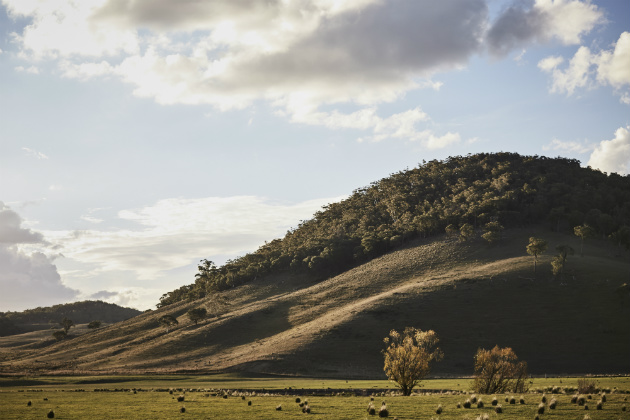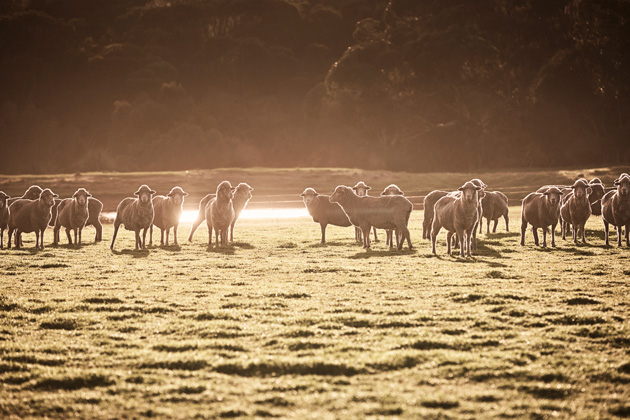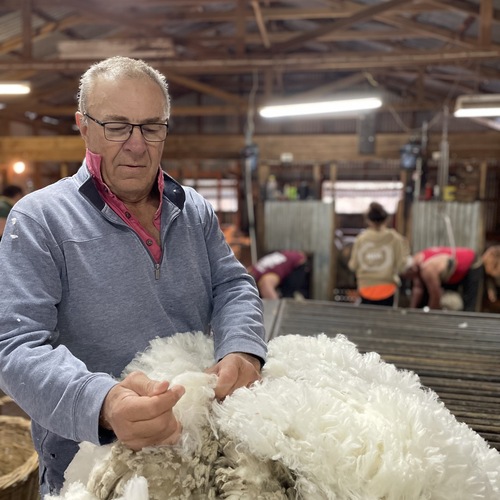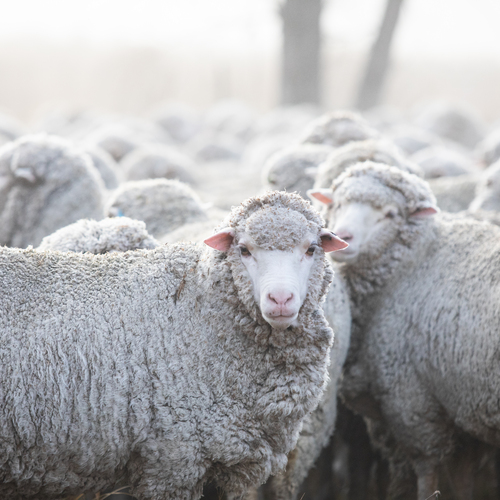Statutory Obligations

As the designated Industry Services Body for the Australian wool industry, AWI collects woolgrower levies and matching Australian Government funds for eligible research, development and extension.
A Statutory Funding Agreement (SFA) between AWI and the Australian Government is negotiated to ensure those funds are expended prudently and in line with levy payer and the Australian Government's expectations. The Department of Agriculture manages the SFA on behalf of the Australian Government.
The SFA prescribes the following:
- The functions and role of AWI
- How AWI is to operate
- The management and expenditure of levies and funds
- Research and development activities eligible to attract matching government funding
- Sanctions the government can impose should AWI breach the SFA
- Activities AWI is prohibited from being involved in
- How, when and to whom AWI must report and consult.
Click here to download the current SFA.
AWI business model
As wool was the first rural industry to identify the need for research and development, AWI is always mindful of its ultimate raison d'etre - to invest in research, development & marketing (RD&M) to identify new practices and technologies to be adopted by woolgrowers to enhance farm gate returns.
The AWI model is the culmination of almost eighty years of significant industry change and subsequent institutional evolution within the wool research and marketing bodies in Australia. In recent decades, Australia has stopped 'riding the sheep's back' (although Australia continues to be the largest producer (90%) of global fine apparel wool, and wool is the largest rural and sixth largest commodity export from Australia to China). Against this background of a changing industry, the wool industry research and marketing bodies have been continually evolved and refined over time.
AWI as an entity has delivered a relatively long period of stability to industry service provision since its establishment, perhaps indicative that the right model has been achieved. Despite this period of stability, AWI has continued to evolve and improve since its establishment in 2001 ensuring it is 'fit for purpose' and responsive to industry and government needs. Significant change has occurred within the business particularly since 2009.
If anything history has taught us that a key feature of the industry and organisation is change; hence the need to be responsive and adaptive. AWI continues to look at ways of improving the business model on a regular basis to ensure it remains responsive to industry and government.
Woolgrowers have the ultimate influence over their levies in AWI, through the ability to vote on the levy at WoolPoll every three years (including a zero option); and through a robust consultation and engagement plan to seek input on priorities and report on AWI’s performance.
AWI believes that its business model is the beneficiary of the many lessons learned by the industry over 80 years. These lessons, the commitment of the board to be responsive to industry, in addition to the statutory requirements of WoolPoll, the independent ROP and various reporting requirements, have driven a culture of performance and reporting within AWI at all levels of the business.
Funding
AWI investments are funded primarily through a wool levy paid by woolgrowers (currently 1.5 per cent of the sale price received for their shorn greasy wool) and a matching contribution from the Federal Government for eligible R&D activities (capped at 0.5 per cent of the value of gross national value of wool production). The sale of Woolmark licences contributes a further important source of income for AWI.
Woolgrowers collectively determine the rate of levy they pay. They vote every three years in Woolpoll on the percentage of wool sales they want invested in research and development and marketing. In the most recent vote - WoolPoll 2024 - woolgrowers voted for a 1.5 per cent levy for 2025/26-2027/28. In previous years it has been a 2 per cent levy. The wool levy paid by woolgrowers is collected by the Federal Government and passed on to AWI.
AWI is focused on delivering results for wool levy payers in line with the priorities identified through industry consultation and reflected in the company's Strategic Plan.
To maximise returns for levy payers, AWI has increasingly adopted an integrated approach to its business, underpinned by research-based marketing: marketing programs based on R&D outcomes, and R&D programs informed by consumer needs and trends.
Other governing obligations
In addition to its statutory funding obligations, AWI's operations are governed by the following:
AWI Constitution (PDF 255Kb)
Federal Government Levy Principles and Guidelines (Department of Agriculture website: PDF 183Kb)
AWI Corporate Governance Framework, including the AWI Board and Committee Charter
Australian Stock Exchange's (ASX) Principles of Good Corporate Governance and Best Practice Recommendations (as far as applicable).
Wool Services Privatisation (Wool Levy Poll) Regulations 2003 (PDF 264Kb)
Review of Performance
A portal has been developed by AWI to report woolgrowers on the implmentation progress of the reccommendations included in the 2021 Independent Review of Performance report.

Independent Reviews of Performance
2019-2021 three year review
AWI has welcomed its most recent independent review of performance by Accenture Strategy.
The key achievements highlighted in the report included demonstrated strength in AWI’s marketing, as well as its significant flexibility in pivoting to digital campaigns through COVID-19; and the improvement in AWI Board and organisational culture, being more positive, constructive and collaborative.
The report noted the “significant external and internal challenges that have affected the wool industry and AWI over the last three years”, including COVID-19 as a major interruption to marketing and consumer purchasing and the significant reduction in AWI’s budget.
In summary, the report concluded: “Given this difficult context, AWI has shown notable improvement in its performance. AWI has achieved several significant objectives with further improvement possible. Overall, results from activities, surveys of levy payers and interviews
with AWI staff suggest that despite the difficult backdrop, AWI’s performance has been appropriate.”
Overall, Accenture’s evaluation is that AWI’s performance is meeting or part meeting most of the performance principles. In terms of areas for improvement, the report identified a need for AWI to clarify its strategic focus, and opportunities for AWI to improve its engagement with stakeholders.
AWI has committed to implementing all recommendations.
Key findings include:
- Evidence of a strong collaborative culture, with over 200 collaborations completed in the last few years, on a number of different issues (e.g. EU Product Environmental Footprinting project) and strong engagement with Meat and Livestock Association in particular.
- Strong marketing activities (e.g. Luna Rossa Prada and China digital campaigns) have provided clear gains for the global wool industry with an opportunity to strengthen overall ‘wool’ brand management.
- There has been improvement in stakeholder engagement over the last three years especially through enhanced industry consultation mechanisms via the Woolgrower Industry Consultative Panel (WICP) & Woolgrower Consultation Group (WCG).
- Research programs are meeting short term objectives and have real areas of strength.
Among the recommendations:
- Increase mixed farming and Next Generation representation on the Wool Industry Consultative Panel.
- Commission an independent report to measure current, and predict future trends, in consumer sentiment towards mulesed wool in relevant global markets. This should include economic modelling to determine the impact of these trends on wool price and production.
- The AWI Board should oversee the strategic planning for the 2022/23 period and beyond by ensuring alignment to the Wool 2030 Strategy, and alignment of AWI’s vision and purpose with shareholders and levy payers.
- Changes to Board tenure and Board nomination processes are yet to be fully discharged. While key changes have been enacted or planned, the impact of these changes will not materialise in the timeline of this review. Thus, the impact of these activities should be included in the next review of performance.
- Undertake an internal review of the WoolQ project focusing on the development of an ongoing stakeholder engagement strategy for the program including the groups involved in the initial Wool Selling Systems Review (2017).
The 60-page report is published in full here.
2015-2018 three year review
In compliance with the Statutory Funding Agreement (SFA), an independent review of performance of AWI was undertaken prior to the 2018 WoolPoll.
In 2018, the Government took the lead in contracting and managing the independent consultant (Ernst & Young) undertaking the review. The review also considered some additional matters that were raised by industry and government.
AWI welcomed the expanded review and fully cooperated at every stage to ensure the consultants had access to all the information required to make their recommendations.
In summary, 82 recommendations were suggested, with the areas of monitoring and evaluation, consultation and governance being the focus. The recommendations range in levels of importance from 'mandatory', 'critical' and 'recommended' and provide the company with timing suggestions for completion helping to pave the way for greater consultation, transparency and accountability.
The Report also included important context about the scale of the Australian wool industry and the scope of AWI’s research and development role, including:
- The significant contribution of the wool industry to the Australian economy, including a $4.3 billion contribution to exports in 2017/18 (up from $1.9 billion 2009/10) and the employment of 200,000 people. This has seen the gross value of the Australian wool clip double since AWI recommenced a focus on strategic targeted marketing investments to drive demand for wool.
- EY’s finding of a gap between perception of AWI operations, policies and procedures, compared to the evidence they have reviewed. This has highlighted the need for AWI to focus on better explaining our processes and procedures and ensuring targeted open two-way consultation and communications.
- The range of forces impacting on the Australian wool industry and AWI’s role, including changes in processing, consumer behaviour, design trends, digital disruption and emerging markets.
- The current healthy state of the wool market for Australian growers, assisted by the Marketing and R&D activities of AWI.
View the 2015-2018 Three Year Review full report and the summary report.
2012-2015 three year review
In compliance with the SFA, in 2015 AWI conducted an independent review of performance prior to the 2015 WoolPoll.
The authors (Deloitte Private) of the 2012-2015 independent review concluded that organisational improvements, including engagement and collaboration, governance and operations, strategy and structure had created value for woolgrowers in several ways:
- Increased market demand through AWI’s marketing and promotion activities
- Higher wool prices, in part attributed to AWI’s marketing and promotion activities
- Improved on-farm and off-farm productivity through AWI’s R&D activities
- Cost savings as a result of AWI’s on-farm and off-farm R&D activities.
View the 2012-2015 Three Year Review full report (PDF 1.41Mb), or view the 2012-2015 Three Year Review summary(PDF 223Kb).
The report contained eight recommendations. Review AWI's Response and Implementation Plan (PDF 48Kb).
2009-2012 three year review
In compliance with the SFA, in 2012 AWI conducted an independent review of performance prior to the 2012 WoolPoll.
Key findings by the authors of the 2009-2012 independent review included:
- "the performance of AWI as judged by this Review represents a significant turnaround from the company's performance as described in the 2009 Review and there is clear evidence of the very significant efforts of the Board and senior management to establish, document and communicate the processes and procedures consistent with good corporate governance."
The overall findings of the independent review of performance were that AWI has
- complied with its SFA requirements
- delivered operations against the relevant Strategic and Annual Operating Plans
- made significant progress in the implementation of the recommendations from the previous (2006-2009, 2010/11 and 2011/12) reviews of performance.
View the 2009-2012 Three Year Review full report (PDF 979Kb), or view the 2009-2012 Three Year Review summary (PDF 303Kb).
The report contained four recommendations. Review AWI's Response and Implementation Plan (PDF 50Kb).
2010/11 voluntary one year review
Following completion of the 2009/10 independent review of performance AWI volunteered to conduct an additional independent review of performance in 2010/11.
Key outcomes of the 2010/11 independent review included progress in the following areas:
- Strategic direction; strategy setting process; internal structures for planning and evaluation; staff performance management; board governance.
Major recommendations included:
- expanding the biennial stakeholder survey to cover all stakeholders; and
- implementation of monitoring and evaluation framework.
Minor recommendations included:
- public release of Annual Operating Plan; greater integration of stakeholder engagement in planning; clarification of AWI role's in the global industry context; and improved strategic planning framework documentation.
View the 2010/11 Voluntary One Year Review (PDF 1.44Mb).
2009/10 one year review
As a requirement of the SFA, AWI conducted a one-year-on independent review of performance for 2009/10, to assess progress with implementing recommendations from the 2006-2009 three-year review.
The 2009/10 one-year-on independent review of performance noted significant progress by AWI in all areas assessed.
Key outcomes included progress in the following areas:
- Position and role in the industry; company structures and processes; and conducting the one-year-on independent review of performance
- The review concluded that AWI had addressed all recommendations of the 2006-2009 independent review of performance.
Areas identified for improvement included:
- Strategy setting process; measurement and reporting; internal structures for planning and evaluation; consultation and engagement; corporate governance; appointment of directors; risk, fraud and intellectual property; documentation and communication.
View the 2009/10 One Year Review (PDF 816Kb).
2006-2009 three year review
In compliance with the SFA, in 2009 AWI conducted an independent review of performance prior to the 2009 WoolPoll.
Areas identified for improvement included:
- Position and role in the industry; company structures and processes; strategy; measurement and reporting; internal structures for planning and evaluation; consultation and engagement; corporate governance; appointment of directors; risk, fraud and intellectual property; documentation and communication
- A specific recommendation was that AWI conduct a one-year-on independent review of performance for the 2009/10 period. This requirement was enforced by a special clause in AWI's 2010-2013 SFA, negotiated following WoolPoll 2009
View the 2006-2009 Three Year Review (PDF 328Kb).














